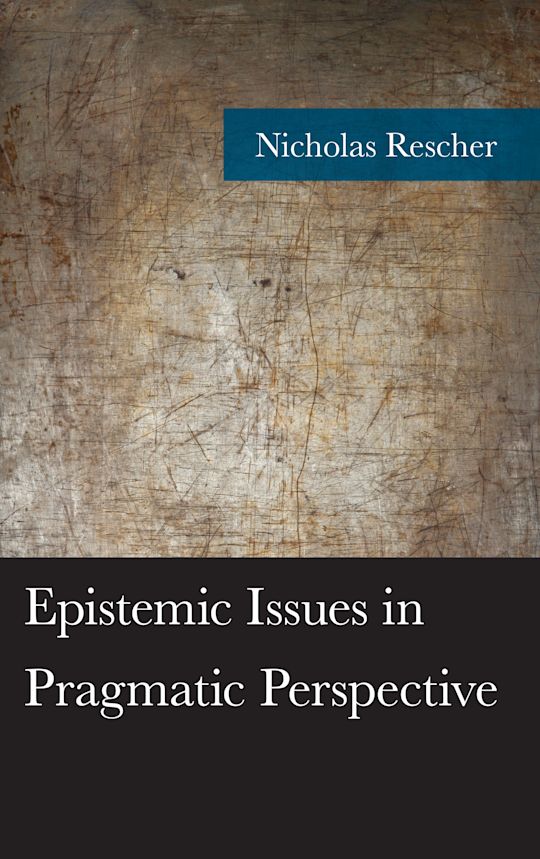- Home
- ACADEMIC
- Philosophy
- Epistemology
- Epistemic Issues in Pragmatic Perspective
Epistemic Issues in Pragmatic Perspective
This product is usually dispatched within 1 week
- Delivery and returns info
-
Free US delivery on orders $35 or over
You must sign in to add this item to your wishlist. Please sign in or create an account
Description
This book presents a nonstandard approach to epistemology. Where standard epistemology generally focuses on the certain knowledge the Greeks called epistêmê, the present focus is on some less assured modes of information. Its deliberations will focus on such cognitively suboptimal processes as conjecture, guesswork, and plausible supposition. This shift of focus has implications for virtually every sector of information management, and the book’s instigations presented here will explore some of them. Throughout the rule of pragmatic considerations stand in the foreground.As the book’s deliberations set out in detail, the nature of our knowledge of reality is inherently conditioned by the fact of its beings the product of what is, at best and at most, a matter of rational guesswork. And so as regards our knowledge, we had best adopt the pragmatic optimism of expecting—and hoping—that our best is good enough.
Table of Contents
INTRODUCTION
Chapter 1:Sensible Conjecture
Chapter 2:Imprecision
Chapter 3:Truth-Contextuality and Plausibility
Chapter 4:Managing Imperfect Information
Chapter 5:Common Sense
Chapter 6:Terminating Explanatory Regress
Chapter 7:Quantitative Epistemology
Chapter 8:On Kinds of Things
Chapter 9:Prediction and Knowability
Chapter 10:Cognitive Fashions
Chapter 11:Problems of Absolute Truth
Chapter 12:Unethical Beliefs, Reprehensible Opinions
Chapter 13: Culpable Ignorance
Chapter 14:Epistemic Triage
Chapter 15: Inconceivable Possibilities
Chapter 16: Optimalism in Explaining the Nature of Things
Chapter 17: Conclusion
Product details
| Published | Dec 06 2017 |
|---|---|
| Format | Hardback |
| Edition | 1st |
| Extent | 240 |
| ISBN | 9781498563536 |
| Imprint | Lexington Books |
| Illustrations | 11 b/w illustrations; 7 tables; 8 textboxes |
| Dimensions | 9 x 6 inches |
| Series | American Philosophy Series |
| Publisher | Bloomsbury Publishing |
About the contributors
Reviews
-
Rescher has a wonderful talent for moving from common sense observations to profound philosophical conclusions in just a few clearly reasoned steps. Here that talent is in full display with an analysis of the various pragmatic mechanisms of rational guesswork, plausible conjecture, analogical reasoning, extrapolation, and inference by explanation that really make up what we rely on as ‘knowledge,’ both scientifically and in our everyday lives.
Patrick Grim, Stony Brook University
-
Nicholas Rescher began publishing on epistemology and pragmatism in 1964, and has long been the leading philosopher in the area. This book collects his recent essays in the field, giving special attention to such nonstandard sources of information as rational guesswork and plausible supposition. It highlights Rescher's distinctive focus on the justification of epistemic standards by their utility in shaping our effective practices. Readers will come away with a deeper understanding of the role of pragmatic factors in epistemic evaluation and their compatibility with objectivity and realism.
Paul K. Moser, Loyola University Chicago
-
Epistemic Issues in Pragmatic Perspective is an excellent book. Rescher updates his clearest, articulate, and quite wonderful journey through the heart of pragmatic epistemology. In past works he has argued that “truth” as we usually understand it, is not a necessary condition for propositional knowledge about the external world. For the persuasive reasons he urges, there is always some real probability that any of our beliefs about the physical world will be rejected and replaced in the future. Accordingly, the attainment of truth is always, and only an “Aspirational goal” rather than a necessary condition for knowledge providing certainty. What the real world is at any given moment is what the human mind constructs and represents in its most useful pursuits of biological and evolutionary adaptation.
In the end he notes that some of our beliefs will be correct descriptions of the world, but our inherent limitations as a species prevent us from deciding once and for all which of our beliefs are closest to our aspirations to truth.Robert Almeder, Georgia State University


































